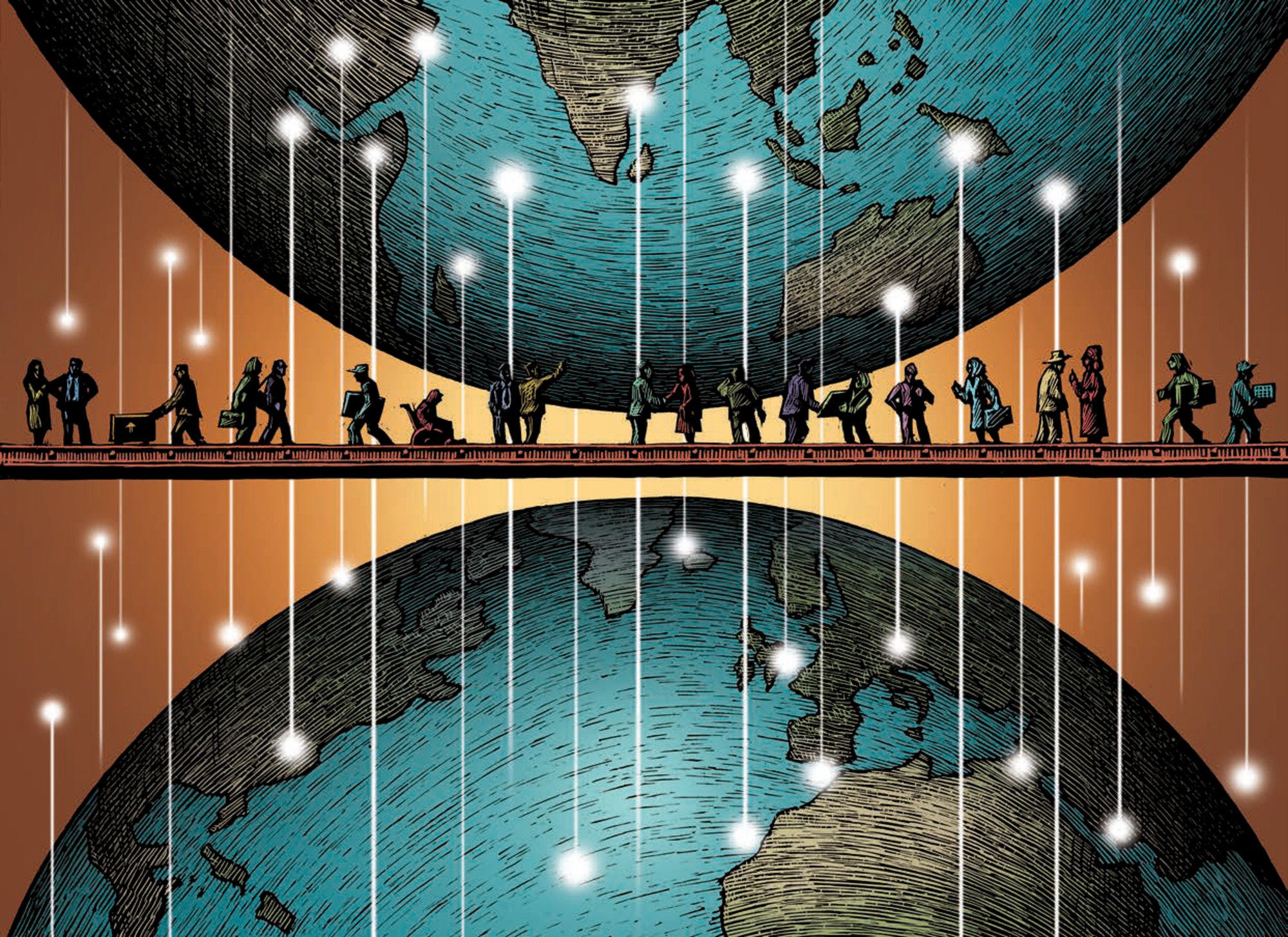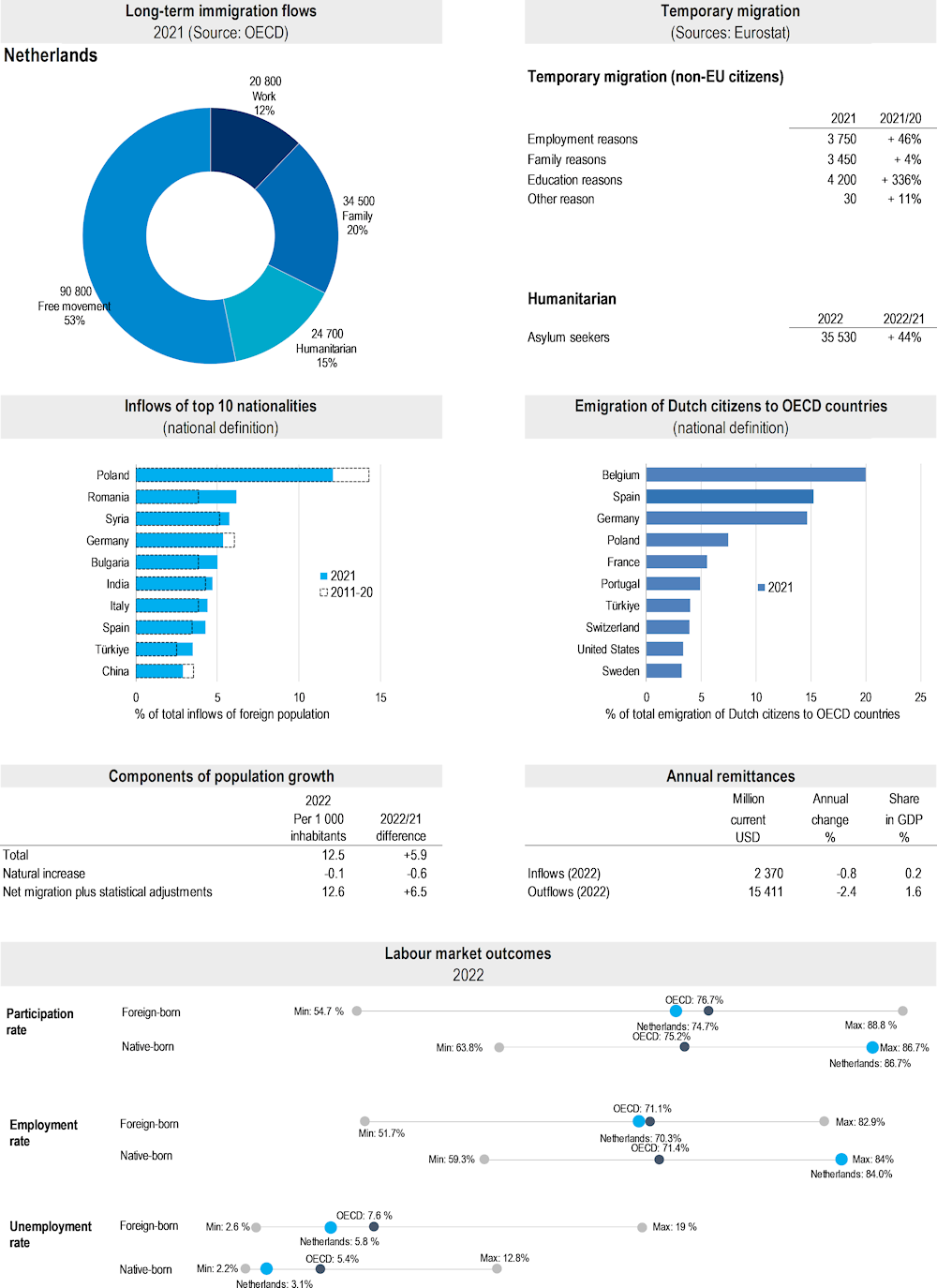In 2021, the Netherlands received 171 000 new immigrants on a long-term or permanent basis (including changes of status and free mobility), 29% more than in 2020. This figure comprises 53.2% immigrants benefitting from free mobility, 12.2% labour migrants, 20.2% family members (including accompanying family) and 14.5% humanitarian migrants. Around 20 000 permits were issued to tertiary-level international students and 2 300 to temporary and seasonal labour migrants (excluding intra-EU migration). In addition, 153 000 intra-EU postings were recorded in 2021, a ‑61% decrease compared to 2020. These posted workers are generally on short-term contracts.
Poland, Romania and Syria were the top three nationalities of newcomers in 2021. Among the top 15 countries of origin, Syria registered the strongest increase (+6 100) in flows to the Netherlands compared to the previous year.
In 2022, the number of first asylum applicants increased by 44%, to reach around 36 000. The majority of applicants came from Syria (13 000), Afghanistan (2 700) and Türkiye (2 700). The largest increase since 2021 concerned nationals of Syria (+4 300) and the largest decrease nationals of Afghanistan (‑300). Of the 17 000 decisions taken in 2022, 87% were positive.
Emigration of Dutch citizens to OECD countries increased by 23% in 2021, to 38 000. Approximately 20% of this group migrated to Belgium, 15% to Spain and 15% to Germany.
In January 2022 the Aliens Employment Act was amended. Work permits can be issued for up to three years instead of one, with a maximum of two years for permits subject to a full labour market test. Another important change requires employers to pay the wages specified in the work permit within one month through a designated bank account. Failure to do so may result in the revocation or non-renewal of the permit. The amended law also allows for the rejection of permit applications if the employer’s business lacks the economic activity to ensure its ability to pay wages.
The new Civic Integration Act (Wet Inburgering), which came into force in January 2022, introduces significant changes to the integration process for newcomers. The law outlines three different learning pathways: one involving volunteer work while learning Dutch to reach a B1 level within one year; another directed at young migrants aiming for higher education or vocational training with a B1 language requirement; and a third for migrants facing challenges with the previous options, focusing on basic language skills at an A1 level. Municipalities are responsible for implementing and monitoring these pathways, carrying out assessments to determine the appropriate learning route and providing guidance on suitable educational institutions.
As of 22 July 2022, based on their permit approval letter visa‑exempt highly skilled migrants are allowed to work immediately. The requirement to obtain a residence permit sticker before starting work has been removed to reduce waiting times. Instead, individuals have a four‑month period to attend an in-person appointment with immigration authorities to obtain the necessary documents for a work permit. This policy does not apply to EU ICT or Blue Card holders. Originally intended to be a temporary scheme for six months, the policy has been extended beyond its original end date in January 2023.
On 26 September 2022, the Minister for Migration announced the extension of the maximum decision period for asylum applications. This gives the Immigration and Naturalisation Service (IND) an additional nine months to process and assess asylum applications, effectively increasing the maximum statutory decision period to 15 months.
On 10 February 2023, the ban on family reunification for asylum seekers who have been granted residence in the country was lifted. This decision came just one month after the temporary suspension of these restrictions. The Dutch authorities made this change following a ruling by the Council of State, which found the ban on family reunification to be unlawful. The original restrictions on family reunification were introduced in August 2022 in response to the housing crisis and the influx of asylum seekers.
For further information: www.ind.nl

